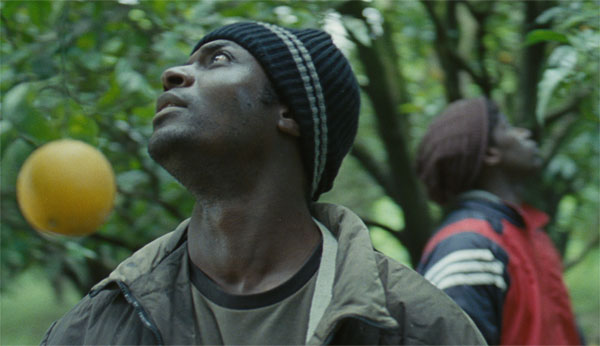Jonas Carpignano’s Mediterranea “looks at migrant life from the perspectives of Ayiva (Koudous Seihon) and Abas (Alassane Sy), two friends from Burkina Faso who arrive by boat at the Calabrian city of Rosarno and are routed into jobs at an orange grove,” Wesley Morris tells us in his latest dispatch from Cannes to Grantland. “The Italian residents crack down violently on the migrants. The migrants strike back…. Films like this… can be little more than their stance,” but Carpignano “avoids the zombification of realist film protagonists. Sy and, especially, Seihorn contribute personality and pensiveness to their work.”
“Rarely has the phrase ‘ripped from the headlines’ seemed so literal,” writes Jordan Hoffman in the Guardian. “Most of Mediterranea is observational, not too heavy on plot. The documentary-style shooting works in its favor, but when the third act gears up, there is a jolt of unexpected violence. There is antagonism between the migrant community, the police and some rabble-rousing locals looking for a fight. Suddenly we’re in Spike Lee’s Do the Right Thing, and while it isn’t beyond believability, it seems a little out of left-field considering the storyline thus far. Or it could just be that I had my head in the sand, like so many seem to do about this looming issue.”
“The remarkable success of Carpignano’s debut feature, which he adapted from his prizewinning short, can be largely attributed to how well the film locates its characters in their migration,” writes David Ehrlich for Little White Lies. “Seihon’s touching and acutely aware performance transmutes the Burkina native’s off-camera odyssey to the screen in such a way that his character never feels purely representative. That the noble purpose of Aviya’s trip is complicated by a reasonable dash of self-interest only makes him more compelling, contributing to the a sense of intimacy that’s fostered by Carpignano’s roving close-ups.”
“The film never devolves into hand-wringing poverty porn,” writes Ben Croll at Twitch. “One particular moment stands out above others. After a long days work, the migrants gather for some drinks at someone’s home. There’s beers and laughs, all relayed by the director’s roving, handheld camera. Carpignano gets in close, whipping and panning in tight close-ups and the entire event seems like a huge, raucous blast. Not until the end of the scene does he cut to a wide-shot, and we realize the entire action has been between five people sitting in a dingy room the size of a broom closet.”
With clips from Mediterranea
“In addition to bursts of borderless pop princess Rihanna, there are gentle acoustic contributions by composers Benh Zeitlin and Dan Romer, who collaborated on Beasts of the Southern Wild,” notes David Rooney in the Hollywood Reporter. “The rough-edged looseness of cinematographer Wyatt Garfield‘s visuals recalls that film, notably in the nervy handheld camerawork of the opening journey and concluding riots.”
“Though it allows us to share in their ordeal, the film doesn’t presume to ‘know’ its protagonists by the end, yielding a more complex and challenging portrait,” finds Peter Debruge in Variety, where Nick Vivarelli interviews Carpignano. And for Indiewire‘s Eric Kohn, Mediterranea “renders a global crisis in strikingly intimate terms.”
Update, 5/25: “Informed by a kind of observational humanism, Carpignano neither sanctifies his characters nor simplifies their situations,” writes Jessica Kiang at the Playlist. “In fact, the filmmaker’s eye is of the respectful, intelligent and well-informed outsider—an embedded observer, rather than a participant—but just as he clearly cares a great deal about the issues the film raises, he seems to have faith that the audience will care too, not through manipulation, but simply by falling into step alongside Ayiva during this brief, crucial period of his life. He is right.”
Update, 5/28: Camillo De Marco has a bit of background on Carpignano at Cineuropa. His 2012 short, A Chjàna, “won the Controcampo Award at the 68th Venice Film Festival along with a Nastro D’Argento Special Mention from Italian Film Journalists (SNGCI). Thirty years old with a mother originally from Barbados and an Italian father, Carpignano has spent his life between New York and Italy. His latest short film, A Ciambra, won the Discovery Award at the 53rd Critics’ Week at Cannes…. Carpignano will now work with the Cinéfondation of the Cannes Film Festival to transform the short film A Ciambra, the story of Pio, a young Romany gypsy from Gioia Tauro, into a feature film.”
Update, 6/13: “A 2012 Filmmaker Magazine new face in independent film, Carpignano has proven himself to be a singular voice in today’s cinema landscape,” writes Ariston Anderson, introducing her five questions for him.
Update, 7/12: “Though realized with great empathy and tact, the film fails to convey the catastrophic extent of the situation it addresses by keeping its narrative too tightly focused,” finds Giovanni Marchini Camia at the Film Stage.
Cannes 2015 Index. For news and tips throughout the day every day, follow @KeyframeDaily. Get Keyframe Daily in your inbox by signing in at fandor.com/daily.




